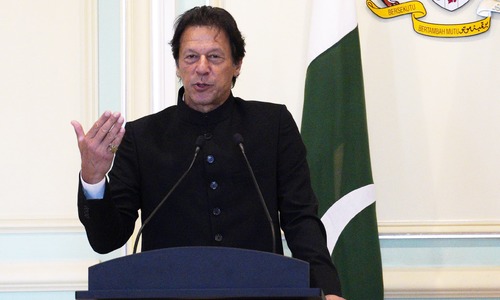ISLAMABAD: The country’s defence and current expenditures surged significantly while development spending dropped drastically in the first quarter of the current financial year as consolidated fiscal deficit widened to 1.4 per cent of gross domestic product (GDP).
According to fiscal operations data released by the Ministry of Finance on Friday, the total defence spending during the first three months (July-September 2018) rose to 0.6pc of GDP, compared to 0.5pc the same period last year. In absolute terms, the defence expenditure increased by 21pc to Rs219.4bn from Rs181bn in the first three months last year.
The current expenditure in the first quarter increased by 19pc to Rs1.48 trillion, compared to Rs1.24tr the same period last year. As percentage of GDP, current expenditure was up by 3.9pc this year against 3.5pc last year.
Development spending drops drastically in first quarter of current financial year
The Public Sector Development Programme (PSDP), on the other hand, plunged by 35.5pc to Rs106.6bn in the first three months this year against Rs165bn of the comparable period last year. In other words, the PSDP spending was down to 0.3pc of GDP, compared to 0.5pc last year.
Of this, the federal PSDP went down by almost 27pc to just Rs50.87bn this year, compared to Rs69.55bn last year, mainly because of slower pickup in development spending and a ban on disbursements because of political transition.
Provincial PSDP expenditure posted even larger drop of 41.6pc to Rs55.73bn, compared to Rs95.4bn of the first quarter last year. On top of this, the four provinces together posted a rare cash surplus of a record Rs246bn in the first quarter of the current fiscal year, compared to Rs82bn surplus in the same period last year, showing a hefty 200pc cushion to the federal government. This was mainly because of a political transition, resulting in slower than usual spending on development projects.
Even then, the consolidated fiscal deficit increased to 1.4pc of GDP or Rs542bn in the first quarter of the current financial year, compared to 1.2pc or Rs441bn in the same period last year when development expenditures were significantly higher and current expenditure slower. With this pace, deficit could go well beyond 5.6pc of GDP at the end of current fiscal year. Last year, the overall fiscal deficit had gone past 6.6pc of GDP when the first quarter deficit stood at 1.2pc of GDP.
The total expenditure in the first three months of the current fiscal year also increased to 4.3pc of GDP or Rs1.643tr, compared to 4.1pc or Rs1.465tr.
Mark-up payments also inched up to 1.3pc of GDP in the first quarter of the current fiscal year and stood at Rs507bn, compared to 1.2pc of GDP or Rs446bn in the same period last year.
On the other hand, total revenue stayed flat at 2.9pc of GDP during the first quarters of both fiscal years. Total revenue amounted to Rs1.1tr this year against Rs1.02tr last year, about 10pc increase in absolute terms.
Likewise, tax revenue also remained unchanged at 2.5pc of GDP even though absolute collection was a meagre 7pc higher at Rs975bn this year. Of this, federal taxes posted a 7.6pc growth to Rs886.5bn, compared to Rs824bn.
Provincial taxes, however, increased by a miserly 1.9pc to Rs88.6bn in the first quarter, compared to Rs86.9bn in the same period last year. The highest cash surplus of Rs126.5bn was posted by Punjab, followed by Rs64bn by Sindh, Rs29.4bn by Khyber Pakhtunkhwa and Rs26.7bn by Balochistan.
Published in Dawn, November 24th, 2018














































